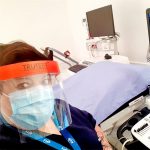
Withdrawing services during the second wave: let’s do a better job
Withdrawing services during the second wave: let’s do a better job
Unless we succeed in quickly stopping the pandemic through our collective efforts, the government will have to consider the possibility of withdrawing certain activities so that personnel can be reassigned to key locations. This is the reality of the situation even if two ministers, Christian Dubé and Lionel Carmant, have said they want to maintain all of the services usually provided to Quebecers.
For the APTS, one thing is crucially important: what happened this spring must not happen again. The stark findings of our assessment leave no room for doubt on that score. When we reviewed the consequences of decisions taken this spring to reassign Class 4 personnel – especially professionals and technicians in psychosocial services, rehabilitation, and nutrition – we found that withdrawal of services and the reassignments that followed were completely improvised, reflecting the disorganization of the health and social services system. Without clear directives and because of serious shortcomings at the management level, APTS professionals and technicians were catapulted into hot zones with very little support and only limited access to personal protective equipment.
As a result of this improvisation, APTS members could not use their expertise and skills to support existing teams. Instead, they were relegated to tasks that were often well below their skill level and could have been carried out by far less qualified people. One example among many to illustrate the mess: in an institution that we prefer not to name, dietitians were withdrawn from their regular tasks in order to wash dishes in a seniors’ residence. Surely it should have been obvious they were needed at the other end of the food chain.
In addition, suspending regular activities led to higher risks for vulnerable people. Often their state deteriorated as intervention windows closed, or they experienced deconditioning when treatment stopped. There was also significant fallout when activities resumed over the summer: the system was completely clogged, creating longer waiting lists and wait times for interventions.
We also need to say that for many APTS members, service withdrawal in the spring created a deeply painful contradiction between their professional obligations and the demands of their managers. At the same time, they felt they were abandoning the people who relied on their services and care. Together, these two phenomena undermined the mental health of APTS members, who were already severely challenged by work overload and the anxiety of working in settings where COVID-19 was rampant.
A matter of balance
Let’s not hold on to illusions: under the second wave, services normally provided by Class 4 personnel will be withdrawn. And until there is a vaccine, there may well be other waves. All the APTS can do is to urge managers of health and social services institutions to talk to local union teams and reach agreement with them on the best practices to keep withdrawal of services and reassignments to a minimum. That will mean they can benefit from the expertise and skills of the professionals and technicians they employ.
This course of action will reduce both negative effects on people who risk being deprived of services to which they are entitled, and additional stress for APTS members. Steps should also be taken to provide psychological support to APTS members who stop providing regular services, both during their reassignment period and when they resume their regular functions. Research shows that the impact of reassignment can be felt several months after the event. Balance in this area will be difficult to achieve, and even more difficult to maintain.
During the second wave, local teams can count on SOTEP, the organization of work and professional issues sector at the APTS. SOTEP has analyzed withdrawal of services and reassignments over the summer, and it will continue to work with other APTS sectors and departments to follow developments and provide guidance. We are doing everything we can to make sure our members make it through this second wave with the least possible disruption in each institution.
For this to happen, though, managers will have to listen to members of union teams. Let’s hope the past does not predict the future.




